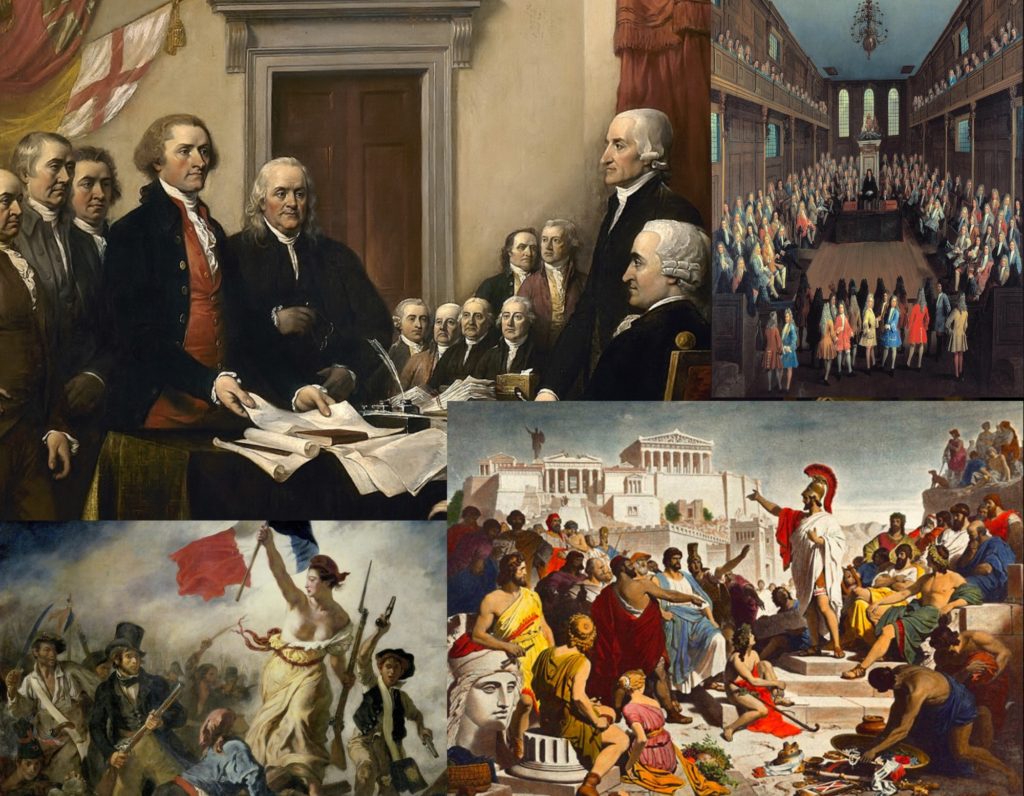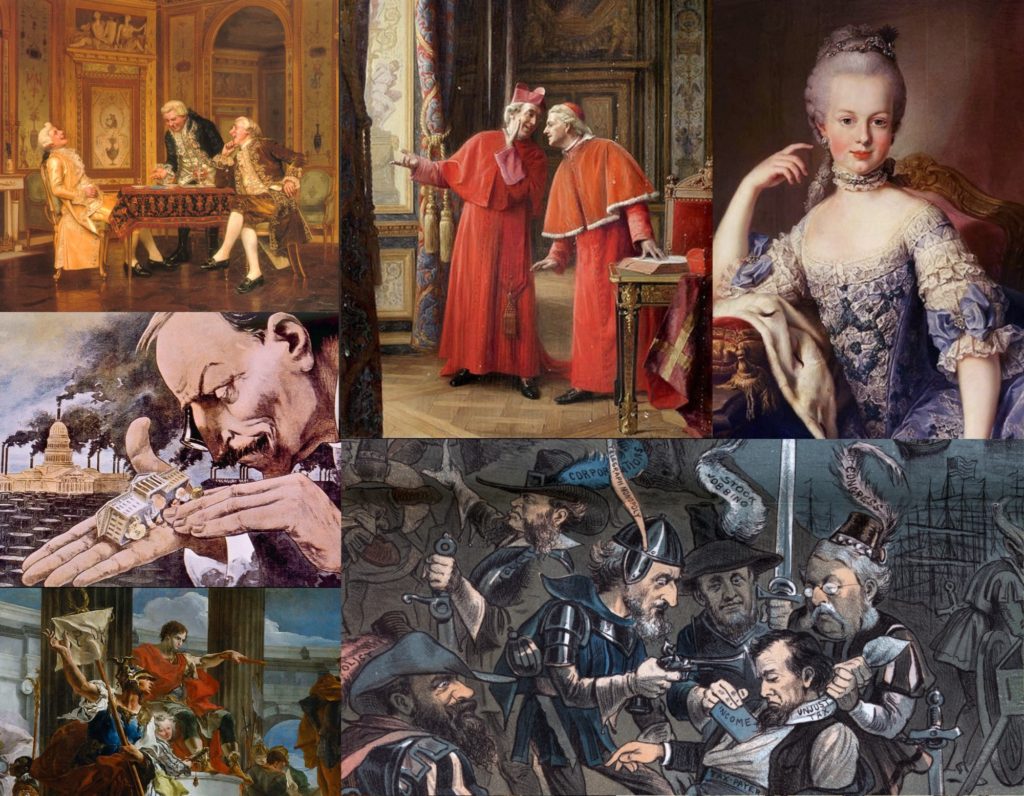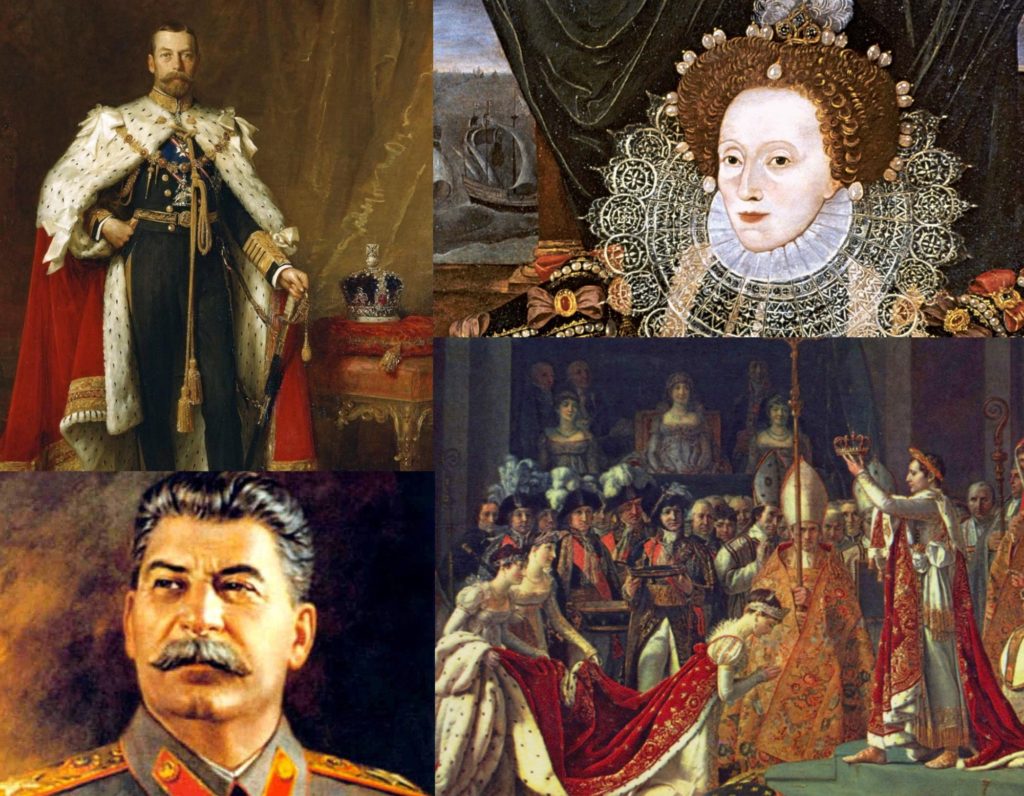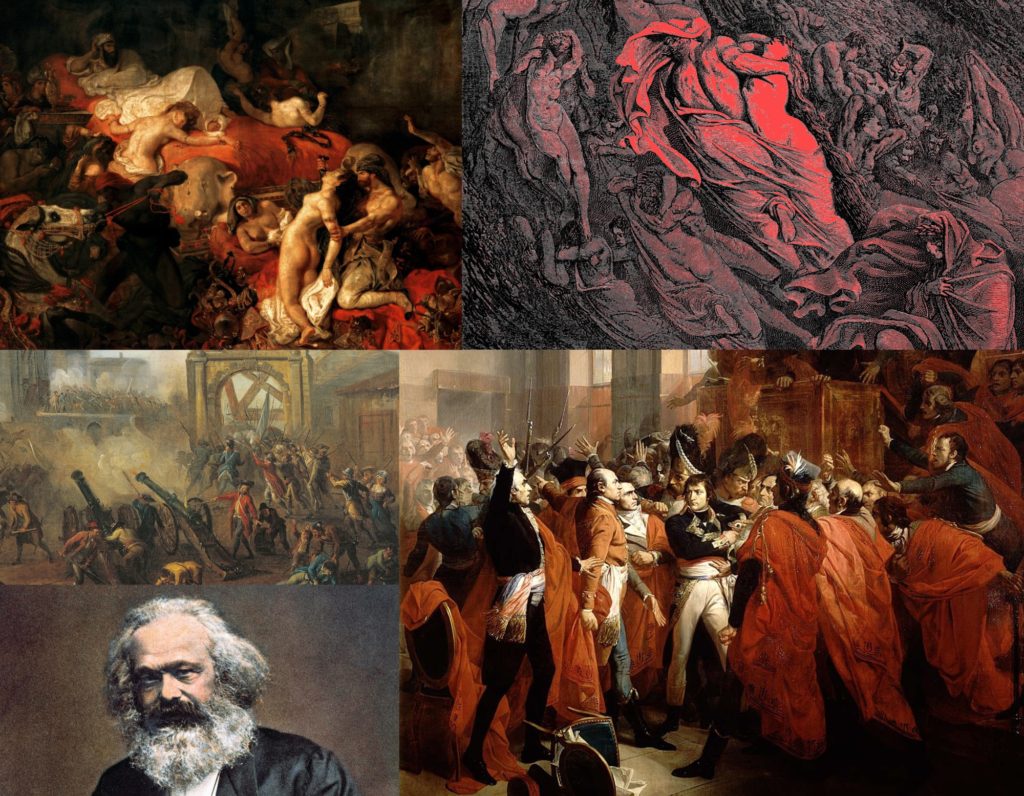
Building a world of wonder and intrigue requires some understanding of government and politics. Throughout history, the world evolved from tribes, to kingdoms, to states. Lets cover some of the most common forms of government, and their examples in history and fiction!
This article is Part 1 of 2. For part two, click here.
Many ways to rule. Many ways of life.
Divine right of kings! Free rule of the people! Bloody swords of tyrants! Clenched fists of resistance!
Throughout history, various peoples came together to form governments by which to organize and concentrate power. Borne out of the inheritance of nobles, the spirit of a people, minds of philosophy, or strength of a charismatic leader, these range from the largest of empires to the smallest of tribes and tribunals. Likewise, the stories that live in our collective imaginations are filled with governments that both resemble and ricochet from those so ingrained in time!
Some truly deep world-building requires a look into how nations thrive and government takes form, how power structures function, the method of how a people bands together, or how a king controls their subjects. There is a lot of ground to cover in that discussion. So today, I’ve taken it upon myself to dig into the specific ways which governments take form in our real world, as well as the examples they take in fiction, fantasy, and sci-fi.
Context and Disclaimers
Naturally, government is its own massive category, and attempting to break things down opens up a substantial “can of worms”. This is why I’m aiming to approach this purely from a world-building or story writing perspective, and focus on “what is it”, and its types. Each definition an example has been independently studied, but not this obviously doesn’t cover everything about a government type. If I feel that any topic needs a deep dive, I’ll draw up its own article!
You will also notice during your own study on governments that some types overlap with others. There are various types of autocrats. A nation can be a constitutional monarchy can have a republic, and an aristocracy. So on, and so forth.
It should also be mentioned that when I say “nation”, I’m not referring only to “nation-states”, which is a relatively newer innovation in world politics when looking at the entire span of history. When I say “nation”, I mean any expanse of land, people, and rulers as a single unit of representation.
Finally, as my list has grown into something of a behemoth, I’ve elected to break this up into two parts. The first part will focus on the types of government that are most common, and that we are most familiar with. The second part will dive into some of the more uncommon, theoretical, and downright weird!

A NOTE from myself: Greetings friends! Thank you for viewing this content. Running a website can be expensive, and we’re not particularly fans of ads. If you could, consider becoming a Site Supporter, and donating via Ko-Fi! … Big thanks!
But what am I waiting for!?
Come with me as we explore the realm of organized power structures in world-building!

Rule of the Many
Democracy – Rule by the People – “The will of the majority”
A form of government in which power is vested in the people. In larger nations, this is through freely elected representatives, although some forms of “direct” democracy exist in smaller form (majority rule), where people vote directly on legislation as a single body. There are various ways to go about a democracy, depending on the size of the group of people, the people representing themselves, and how their power is expressed.
- REAL: Most of the Western Hemisphere, Ancient Greece, Switzerland (direct)
- FICTION: The Free Cities (Game of Thrones), United Earth (Star Trek)
Republic – Rule by Representatives– “A balance of power”
Republics are ruled by elected individuals, whose duty is to represent the needs of their citizens, and exercise power on behalf of the people, according to the law of the land. Often times, these representatives are part of a house, parliament, or divided structure with multiple elected leaders. The kinds of republics often depend on how much power the representatives have vs. the public, and how those representatives are divided.
- REAL: Roman Republic, Free Imperial Cities (Holy Roman Empire), USA, UK, France, Germany
- FICTION: Galactic Republic (Star Wars), Adro (Powder Mage Trilogy)
Democratic Republic – Rule for the People – “Liberty for all”
A familiar cross-section between “democracy” and “republic”. A representative democracy which people elect the representatives, and the representatives have the power to exercise the enacting of legislation. Here, you see a balance of power where “majority rule” is offset by the representation of the minority, in order to allow all groups of people to have power. (Incidentally, many countries in the real world use this term, while being undemocratic or authoritarian.)
- REAL: United States of America, Germany, South Korea, Ethiopia, Taiwan
- FICTION: City of Elendel (Alloy of Law: Mistborn Era 2), Baldurs Gate (Forgotten Realms)
Federation/Confederation – Rule of the States– “Many as one, together or apart.”
A group of several states which are members within a larger union, which decide on legislation for the broader entity.
In a federation, the central authority is a federal government which holds the overall authority, where the states are subordinate to it. This allows overall control over diplomatic, economic, military, and legal issues.
- REAL: Germany, USA, Russia
- FICTION: United Federation of Planets (Star Trek)
In a confederation, the federal government is weaker and accountable to the member states, who are the true authority. These states can negotiate on joint foreign policy, and defensive matters. However, the rest is up to the states individually.
- REAL: CSA, Confederation of the Rhine
- FICTION: Terran Confederacy (Starcraft)

Rule of the Few
Oligarchy – Rule by the Few – “Will of the minority”
Considered an umbrella term for a society with a few, self-appointed rulers, dominating over a significantly larger body of citizens. This comes in a wide variety of forms, depending on what group is considered the ruling class. Throughout history, class systems gave way to prejudice of those of lower class, and privilege amongst those of higher status. In rare situations, this system was preferred over a single autocratic ruler. In most cases, however, this recognized rights only for the few, and authoritarian rule over the many.
- REAL: England (Magna Carta, 1215), Russian Empire, Iran, Saudi Arabia
- FICTION: Waterdeep/Masked Lords (Forgotten Realms)
Aristocracy – Rule by Heirs – “Let them eat cake”
Referring to nobility, this government puts power in the hands of a small, privileged few who inherit their status from birth. Often time, this is not as a system of government itself, but as a mingling of the highest classes in a society which often includes the rich, powerful, and ruling class. A society where those of high birth have significant rights and privileges over the “unwashed” masses.
- REAL: Saudi Arabia, French Nobility (pre-1790), Russian Nobility, English Nobility
- FICTION: The Houses of Game of Thrones
Theocracy – Rule by Religion – “Alpha and Omega”
A government ruled by divine guidance, or individuals who are divinely guided. Often times, leaders are members of a clergy, priesthood, or religious sect. This can come in many forms: the state and religion are one entity, the leader(s) are chosen by a god (or are considered gods), laws are enforced based upon scripture and sacred traditions, mandating of divine or occult worship, etc. The masses must worship to the decree of the clergy-class, and non-believers are of the lowest class, often persecuted.
- REAL: Ancient Egypt, Byzantine Empire, Holy See (Vatican), Calphates, Shang Dynasty
- FICTION: Dune (Dune), Magisterium (His Dark Materials), Air Nomads (Avatar: the Last Airbender), Jedi Council (Star Wars), The Covenant (Halo Series)
Plutocracy – Rule by the Rich – “Greed is good”
A society which is ruled or controlled by those of great wealth or income. This can be conducted as direct rule, by dominating influence over rulers by way of economic power, or by consolidating wealth and using it to control markets directly. Elites come to power through unshared rapid economic growth, or through hoarding diminishing resources and wealth. To remain in power, shifts in trade and economics are played to the plutarchs advantage.
- REAL: USA (Gilded Age, Today), Merchant Republics (Venice, Florence), Carthage, Kingdom of France (pre-revolution)
- FICTION: Panem (The Hunger Games)

Rule of Authority
Absolute Monarchy – Rule of Royalty – “Divine right of kings”
The age-old, royal legacy of the monarch ruling class. Perhaps the most common form of autocracy in history, and especially the “fantasy” genre.
Considered the “traditional” form of monarchy, the anointed sovereign holds supreme authority, not restricted by written laws or customs. These rulers possess “divine right” to enact their rule how they see fit. More often than not, succession is hereditary, centered on a house or family line. Kings/Queens are tended to by their subjects with servitude, and their reign is considered the will of God.
- REAL: Ancient Egypt (Pharaohs), House of Habsburg, France (Louis XIV), England (Charles I)
- FICTION: Robert/Jeoffrey Baratheon (Game of Thrones), Aragorn (Lord of the Rings)
Constitutional Monarchy – Limited Rule of Royalty – “For King and Country”
As ages passed, and the enlightenment approached, revolutions demanded a limit to the power of kings.
Unlike an absolute monarchy, the monarchs authority is derived from, or legally bound, by a constitution or legislature. This rule is executive in power, but may be counterbalanced with a parliament or council of other leaders. Sometimes, this is symbolic only. This can be hereditary, or an elected position.
- REAL: United Kingdom, Norway, Sweden, Japan
- FICTION: Breland (Ebberon), Queen Amidala (Star Wars)
Fascism – Rule by Dictatorship – “Might is Right”
A form of authoritarian government characterized by extreme national identity and forcible oppression of opposition. This system is ruled by a dictator of whom is the premiere image of national pride. Opposition accounts for groups of people who do not fit the national (or ethnic) identity, and foreigners of any sort. This is often enforced by militaristic, strong-man attitudes, and considering a certain people “superior” either in nation, culture, or ethnicity.
- REAL: Nazi Germany, Axis Italy, Saddam’s Iraq
- FICTION: Norsefire Party (V for Vendetta), Pacific States of America (The Man in the High Castle), Terran Federation (Starship Troopers)
Empire – Rule by Expansion– “The Sun Never Sets”
An extensive group of states, countries, and territories under a single supreme authority. This government is characterized by expansionism, the conquering of lands, establishing of colonies, and ruling over peoples of various cultures. In earlier times, this expanse was ruled by a single individual (emperor, empress, czar, tsar), but eventually the definition changed to include colonial empires in which the host nation itself was the authority.
- REAL: Roman Empire, British Empire, Ottoman Empire, Qing Dynasty, Umayyad Caliphate, Aztec Empire
- FICTION: The Imperium (Warhammer 40k), Fire Nation (Avatar: The Last Airbender), Galactic Empire (Star Wars), Broddring Empire (Eragon: Inheritance Cycle)
Autocracy – Rule by Only One – “I am Ozymandias, King of Kings.”
A system of government ruled by one with absolute power. This can be a single person, or party. Decisions of this entity are not subject to legal constraints or popular control of any sort. Leaders are treated with fear, grandeur, and imagery of supreme power. With this said, most still require a power structure to rule, including military, nobles, and other elite groups. Succession is most often hereditary, or through conquering or revolt.
- REAL: Roman Empire (Augustus Caesar), England (King John), Imperial Russia (Tsar), French Empire (Napoleon)
- FICTION: Emperor Palpatine (Star Wars), The White Witch (Chronicles of Narnia), The Governor (The Walking Dead)
Totalitarian – Limitless Rule – “Big brother is watching.”
A political system which recognizes no limits in its authority, and strives to rule every aspect of the public and private life of its citizens. This can be under the power of a single person, faction or class. This is an extensive and pervasive method of rule usually guided by ideology, as the totality of the authority and the ideology can not be questioned. Enforcing such a realm requires near constant surveillance and control. Extreme authoritarianism.
- REAL: USSR, Nazi Germany, North Korea
- FICTION: Oceania (1984), World State (Brave New World)


Revolutionary / Contested Rule
Communism – Rule for Redistribution– “Seize the means of production.”
A socio-economic system where all property is communally owned. Each citizen receives a share of the resources based upon their needs. This emerges as a revolutionary ideology, and becomes the basis of a governments economic policy. Communism is not explicit to a type of rule. Ideologically, it strives to be a “state-less” system. However, historically, this system has been accompanied by governments with a single-party autocracy.
- REAL: USSR, China, North Korea
- FICTION: Thu (The Dispossessed), Arstotska (Papers, Please), Eurasia (1984)
Anarchy – Struggle against Rule – “Down with the system.”
In most definitions, anarchy is a state of disorder due to the absence or nonrecognition of authority. However, anarchy is also a movement of liberation or revolt against a government or set hierarchy, rather than just a destination ideology. Anarchists exist in settings where centralized forms of government rule in contrast, where citizen unrest is growing and intensifying.
- REAL: Revolutionary Catalonia, Free Territory (Ukraine 1918), Democratic Federation of Northern Syria
- FICTION: V (V for Vendetta), Survivorism (Mistborn Series), Rocky Mountain States (The Man in the High Castle)
Military Coup / Junta – Rule by Overthrow – “I am the revolution”
Typically, when an uprising or coup occurs, the victor party becomes its own provisional government. Unlike a stratocracy, this rule is historically short-lived and the legitimacy of the new rulers is in a contested state. The formation of a proceeding government is necessary, but is pending organization, infrastructure, or the end of hostilities. The coup is often violent, but can be peaceful, such as part of a civil emergency.
- REAL: Spain (Napoleonic Wars), German Empire (mid-WWI), Various declarations of Martial Law
- FICTION: StateSec (Honor Harrington Series), Aslon (Legend of Asahiel Series)
Here are the first eighteen of thirty-six; many of the most common types we are familiar with. In my next article, I will cover a couple more common types, but also delve into uncommon, theoretical, and fantastical types of governance.
Thank you for reading! If you have any questions, or suggestions, feel free to reach out!
To continue your journey, check out Worldbuilding: 36 Types of Government (Part 2)
Writers, crafters, and gamers rejoice! … Matthew has a lot of other things to say about writing and worldbuilding. Check out some of the other articles on the subject, and stay tuned for more content!
- Axolotls, Genies, and Kaiju; a Quick TTRPG Zine Roundup #2 - May 19, 2025
- d100 City Encounters and Urban Sidequests - April 26, 2025
- Dirtbags! a Sci-Fi Shooter RPG: Gameplay Review! - March 23, 2025


